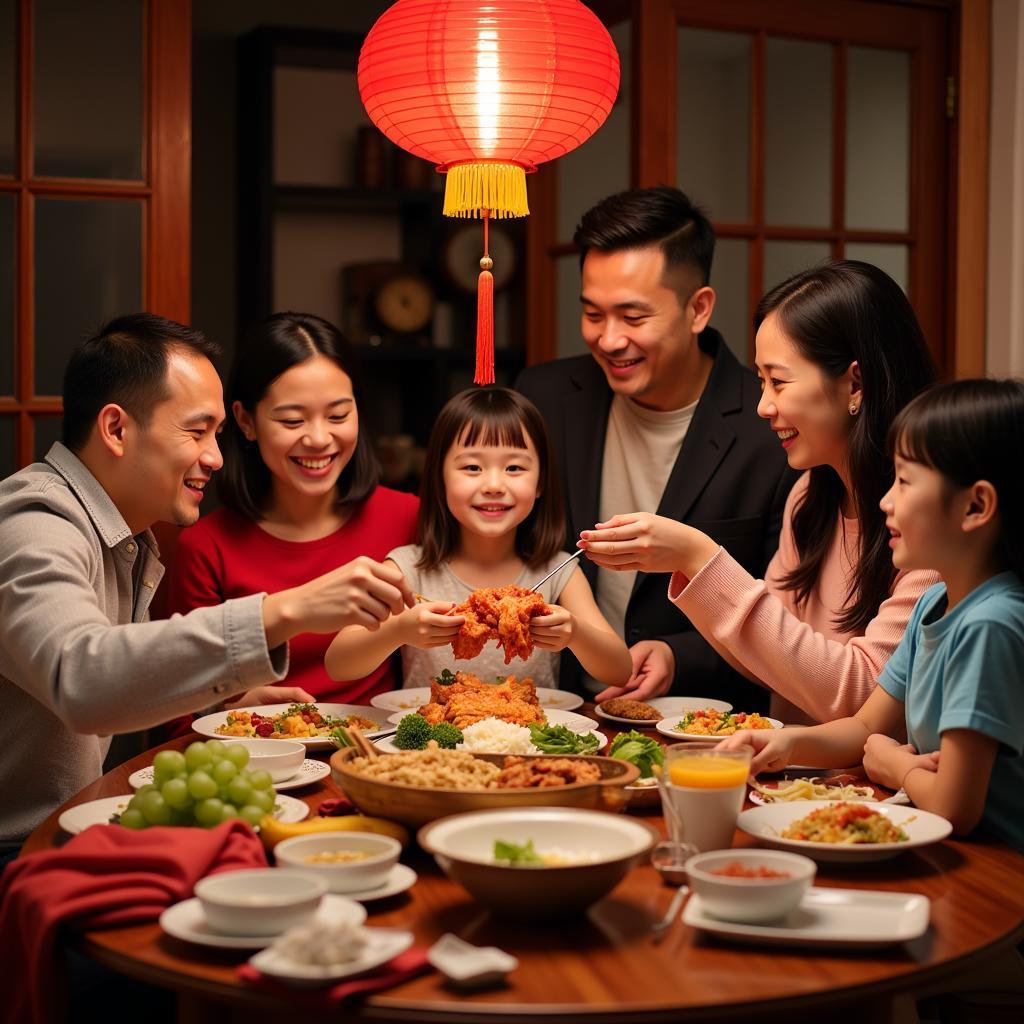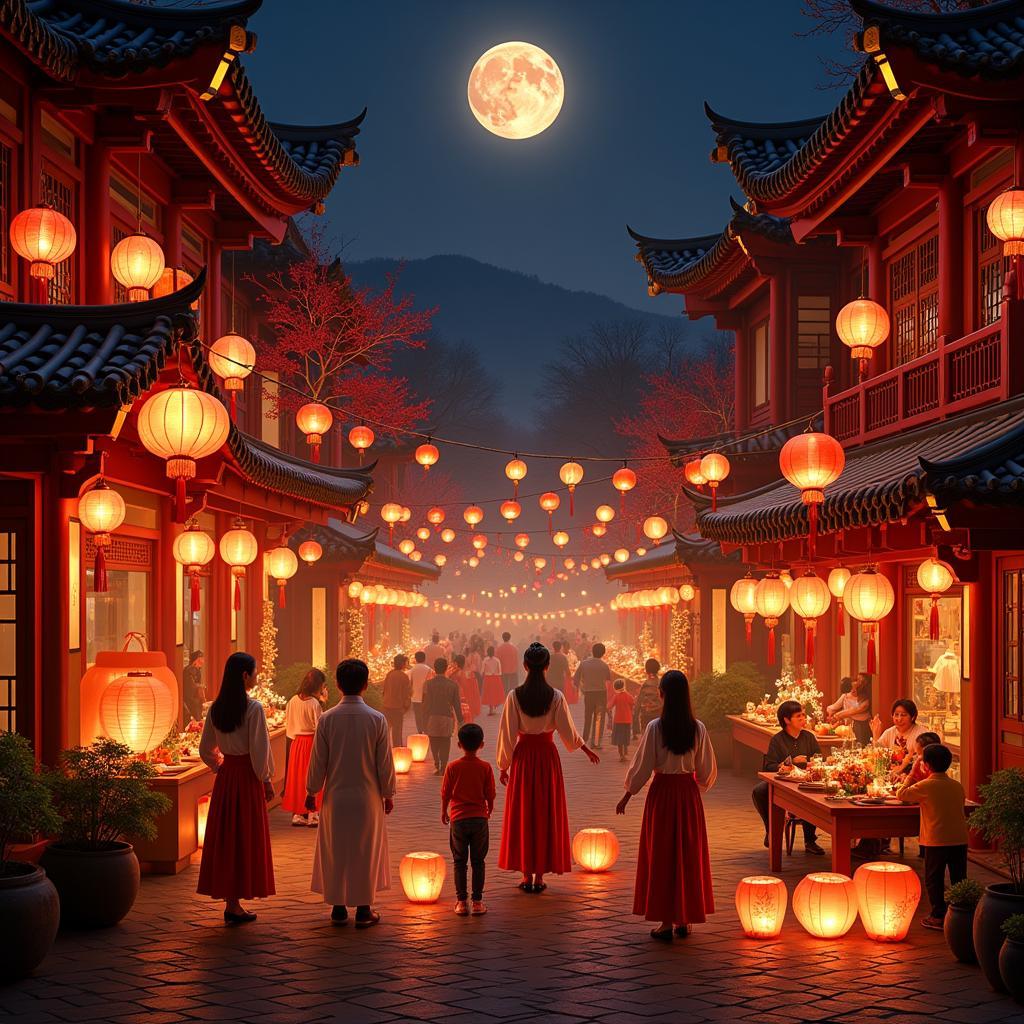Like describe a concert you attended recently, discussing traditional events is a common topic in IELTS Speaking tests that requires careful preparation and cultural awareness.
Part 1: Introduction and Interview Questions
Common questions examiners ask:
- Do you enjoy traditional festivals?
- What traditional events are popular in your country?
- How do people celebrate traditional events in your area?
Sample answer (Band 8-9):
“I’m absolutely fascinated by traditional festivals. In my country, we have numerous celebrations throughout the year, but I’m particularly drawn to our Lunar New Year festival. It’s deeply rooted in our cultural heritage and brings families together through various time-honored customs like preparing traditional dishes and exchanging gifts.”
 Vietnamese family celebrating traditional Lunar New Year festival
Vietnamese family celebrating traditional Lunar New Year festival
Part 2: Cue Card
Describe an interesting traditional event you have participated in
You should say:
- What the event was
- When and where it took place
- Who you were with
- And explain why you found it interesting
Sample Answer (Band 8-9):
Similar to describe a food market you visited in a different city, I’d like to share my experience at a traditional harvest festival.
“I’d like to talk about the Mid-Autumn Festival celebration I attended last year in my grandmother’s village. This centuries-old tradition takes place during the eighth lunar month, typically in September or October. I was there with my extended family, including my parents, siblings, and numerous cousins.
The event was particularly memorable because it perfectly embodied our cultural heritage. The village square was transformed into a vibrant celebration space with beautifully crafted lanterns illuminating the entire area. What made it especially fascinating was how the community came together to prepare traditional mooncakes and organize folk performances.
What struck me most was the seamless blend of ancient customs and modern interpretations. Children performed traditional dances while carrying intricately designed electronic lanterns, demonstrating how our culture continues to evolve while maintaining its core values.”
 Traditional Mid-Autumn Festival celebration with lanterns and performances
Traditional Mid-Autumn Festival celebration with lanterns and performances
Sample Answer (Band 6-7):
“I want to tell you about the Mid-Autumn Festival I went to last year. It was in my grandmother’s village in September. I went there with my family members.
The festival was interesting because there were many activities. People made lanterns and mooncakes. Children played games and carried lanterns around the village. There were also some traditional performances.
I liked it because it was fun and I could spend time with my family. It helped me understand our traditions better.”
Part 3: Discussion Questions
For those interested in describe a foreign food you want to try, traditional events often feature unique culinary experiences.
Q: How have traditional celebrations changed over the years?
Sample Answer (Band 8-9):
“Traditional celebrations have undergone significant transformation in recent decades. While the core values and principles remain intact, the manner of celebration has evolved considerably. Modern technology has revolutionized how people participate in these events, with social media playing a pivotal role in sharing and preserving traditions. However, this has also led to some traditions becoming more commercialized, potentially diluting their authentic essence.”
Key Vocabulary and Expressions
- Time-honored customs (adj.+n.) /taɪm ˈɒnəd ˈkʌstəmz/ – long-established traditions
- Deeply rooted in (adj.+prep.) /ˈdiːpli ˈruːtɪd ɪn/ – firmly established
- Cultural heritage (n.) /ˈkʌltʃərəl ˈherɪtɪdʒ/ – traditions passed down through generations
- Seamless blend (adj.+n.) /ˈsiːmləs blend/ – perfect combination
- Intricately designed (adv.+adj.) /ˈɪntrɪkətli dɪˈzaɪnd/ – created with complex details
Examiner’s Tips
- Use rich vocabulary and complex structures naturally
- Include personal experiences and specific details
- Show cultural awareness and understanding
- Maintain coherent flow throughout your response
- Practice describing various traditional events to build versatility
Remember, discussing traditional events effectively requires balancing cultural knowledge with personal insights, much like describe a book that left a lasting impact on you.


